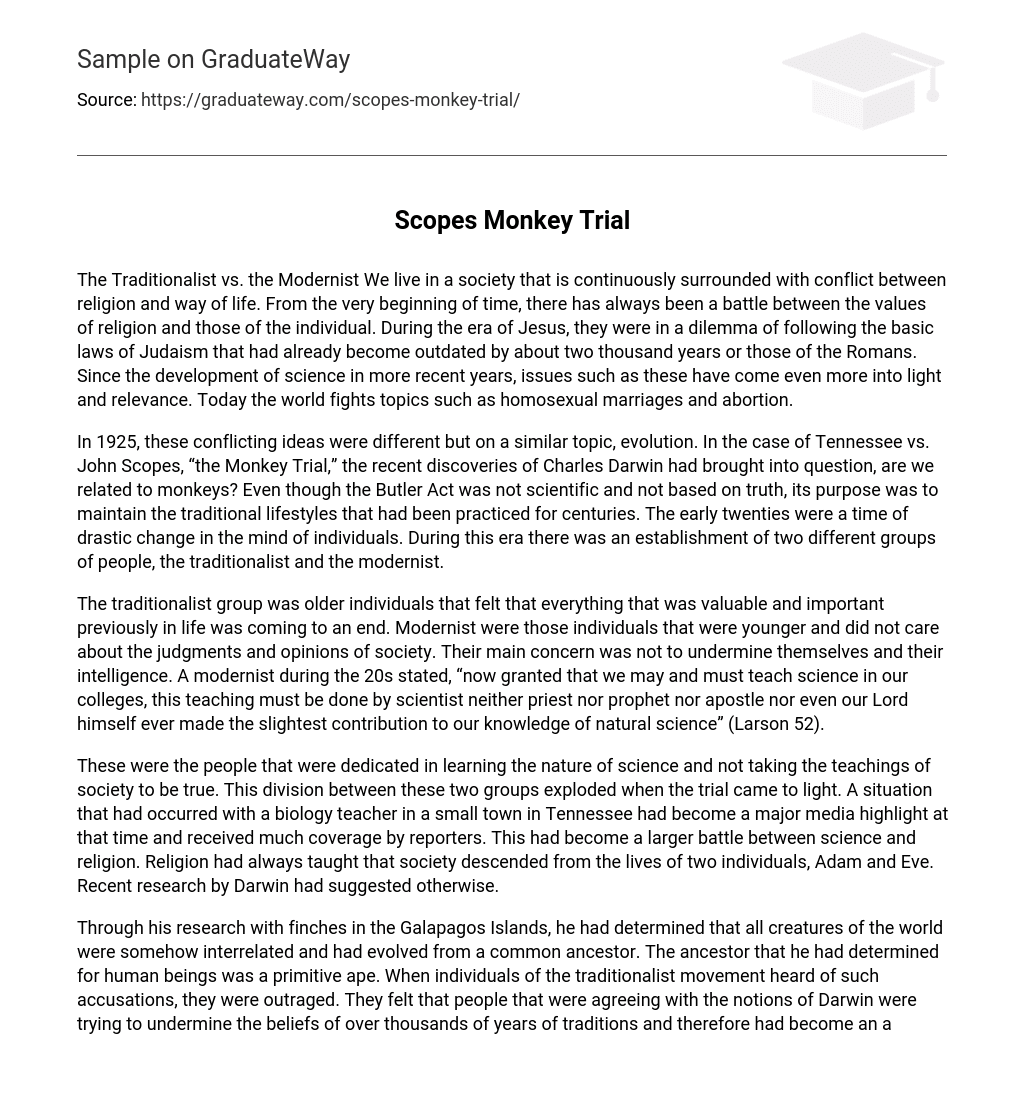The ongoing clash between religion and lifestyle has been a consistent feature of our society. Over the course of history, there has been an ongoing struggle between religious principles and personal convictions. During the era of Jesus, individuals were faced with a decision between abiding by outdated Jewish laws or adopting Roman customs. With scientific progress, these tensions have only intensified. Presently, contentious discussions revolve around subjects such as same-sex marriages and abortion.
In 1925, the Tennessee vs. John Scopes case, also known as “the Monkey Trial,” brought about conflicting ideas regarding evolution and its connection to humans and monkeys based on Charles Darwin’s discoveries. The Butler Act, despite lacking scientific evidence or truth, aimed to preserve long-standing traditional practices. This period of significant transformation in thinking gave rise to two distinct groups: the traditionalists and the modernists.
The older members of the traditionalist group believed that everything valuable and important in life was coming to an end. In contrast, the younger members of the modernist group were not concerned about society’s judgments and opinions. Their main focus was on preserving their own intelligence. For instance, a modernist during the 1920s stated, “now granted that we may and must teach science in our colleges, this teaching must be done by scientist neither priest nor prophet nor apostle nor even our Lord himself ever made the slightest contribution to our knowledge of natural science” (Larson 52).
The conflict between individuals who sought to independently comprehend the principles of science rather than unquestioningly adhere to societal teachings is discussed in this paragraph. The clash occurred when a biology teacher in a small town in Tennessee went on trial, which attracted media attention. This trial became a significant battleground for the ongoing debate between science and religion. Traditional religious beliefs assert that society’s origins can be traced back to Adam and Eve, while Darwin’s research offers an alternative perspective.
Charles Darwin’s study of finches in the Galapagos Islands led him to believe that all creatures on Earth were interconnected and shared a common ancestor. He also hypothesized that humans had a primitive ape ancestor. However, when traditionalists discovered these theories, they reacted with anger because they felt their deeply held beliefs were being challenged and they were being labeled as atheists and outcasts by supporters of Darwin’s ideas.
In February 1925, President William Jennings Bryan and John Butler, a farmer and future state representative candidate, passed a bill that prohibited the teaching of any theory contradicting biblical creation and promoting the idea that humans descended from lower animals (Linder). John Butler, driven by his personal beliefs and background, played a significant role in the Scopes trial and strongly opposed the concept of evolution.
Butler, a committed Baptist, was deeply affected by a preacher’s story about a woman who lost her faith in God after studying biology at a Tennessee university. This encounter made a significant impact on Butler and his beliefs about evolution.
He came back to his farm and witnessed how biology could shape the lives of his three children. He worried that if they embraced the principles of biology, they might become atheists and lose favor with God. Additionally, he noticed a growing epidemic in a school where he occasionally taught, where biology was being taught alongside other subjects. Butler foresaw this issue spreading and causing havoc in many lives. In order to halt this epidemic, he proposed implementing the Butler Act, which would effectively address the problem.
The concept that evolution undermined the values of local residents and introduced more global and non-religious values was supported by Linder. This viewpoint is clearly rooted in tradition. In response to the traditionalist movement and the implementation of the Butler Act, a new group emerged to address these concerns. The American Civil Liberties Union (ACLU) actively opposed legislation that they believed posed a danger to freedom and individual rights in American society, as stated by Larson (60).
The ACLU organization is dedicated to defending free speech and academic freedom for all individuals, including teachers in Tennessee during the Scopes Trial. They offered their assistance in challenging the Butler Act in court, aiming to overturn the law and promote scientific and societal progress. They advocated for the freedom of individuals to use their intellect to expand their knowledge and understanding.
The Scopes trial was a representation of the broader conflict between modernist and traditionalist movements in the 1920s, not solely focused on the clash between evolution and religion. It highlighted the confrontation between established customs and emerging scientific ideas, particularly those related to evolution. John Butler proposed the Butler Act to curb the dissemination of these evolutionary theories and restore adherence to traditional values.
He believed that the theory of evolution was causing people to drift away from their core beliefs in God. The ACLU emerged to oppose this trend and to back those striving for progress in both knowledge and society. The Butler Act aimed to prioritize religious beliefs and customs for all individuals, but it ultimately failed, leading science to become the foundation of society.





